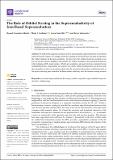Por favor, use este identificador para citar o enlazar a este item:
http://hdl.handle.net/10261/251527COMPARTIR / EXPORTAR:
 SHARE
BASE SHARE
BASE
|
|
| Visualizar otros formatos: MARC | Dublin Core | RDF | ORE | MODS | METS | DIDL | DATACITE | |

| Título: | The Role of Orbital Nesting in the Superconductivity of Iron-Based Superconductors |
Autor: | Fernández-Martín, Raquel; Calderón, M.J. CSIC ORCID; Fanfarillo, Laura; Valenzuela, Belén CSIC ORCID | Palabras clave: | Iron-based superconductors Low energy model Magnetism Spin-mediated superconductivity Orbital nesting |
Fecha de publicación: | 14-sep-2021 | Editor: | Molecular Diversity Preservation International | Citación: | Condensed Matter | Resumen: | [EN] We analyze the magnetic excitations and the spin-mediated superconductivity in iron-based superconductors within a low energy model that operates in the band basis, but fully incorporates the orbital character of the spin excitations. We show how the orbital selectivity, encoded in our low energy description, simplifies substantially the analysis and allows for analytical treatments, while retaining all the main features of both spin excitations and gap functions computed using multiorbital models. Importantly, our analysis unveils the orbital matching between the hole and electron pockets as the key parameter to determine the momentum dependence and the hierarchy of the superconducting gaps, instead of the Fermi surface matching, as in the common nesting scenario. | Versión del editor: | https://doi.org/10.3390/condmat6030034 | URI: | http://hdl.handle.net/10261/251527 | E-ISSN: | 2410-3896 |
| Aparece en las colecciones: | (ICMM) Artículos |
Ficheros en este ítem:
| Fichero | Descripción | Tamaño | Formato | |
|---|---|---|---|---|
| Fernandez_Role_condensedmatter-06-00034_2021.pdf | Artículo principal_Vs_publicada | 780,51 kB | Adobe PDF |  Visualizar/Abrir |
CORE Recommender
Este item está licenciado bajo una Licencia Creative Commons

